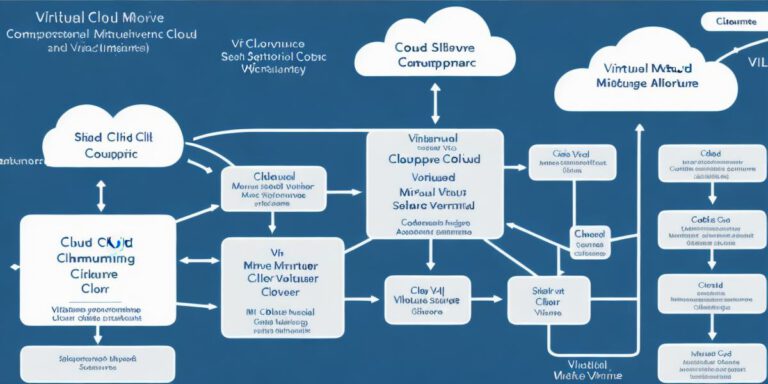VPS vs Cloud Server: Choosing the Right Path for Your Business

In today’s digital world, businesses have multiple options when it comes to hosting their websites and applications. Two of the most popular options are Virtual Private Servers (VPS) and Cloud Servers. Both offer similar functionality, but they differ in terms of scalability, flexibility, security, and cost.
In this article, we will explore the pros and cons of VPS and Cloud Servers and help you choose the right option for your business. We will also provide real-life examples and expert opinions to guide you through the decision-making process.
VPS vs Cloud Server: What Are They?
A Virtual Private Server (VPS) is a virtualized server that runs on top of a physical server. It provides users with the ability to run multiple operating systems and applications on a single physical machine. VPS is an affordable option for small businesses and offers high levels of customization.
On the other hand, Cloud Servers are remote servers hosted by third-party providers that can be accessed over the internet. They offer scalable, flexible, and secure hosting solutions for businesses of all sizes. Cloud Servers are ideal for businesses that require constant access to their applications and data.
Pros and Cons of VPS
VPS is a popular option for small businesses due to its affordability, customization options, and high levels of performance.
Pros:
- High levels of performance and scalability
- Cost-effective option for small businesses
- Offers full control over the server configuration and settings
- Can run multiple operating systems and applications on a single machine
- Provides excellent security options with regular updates and patches
Cons:
- Limited scalability compared to Cloud Servers
- Limited technical support and maintenance options
- Requires technical expertise for setup and management
- Higher risk of downtime and data loss due to hardware failure
Pros and Cons of Cloud Server
Cloud Servers offer scalable, flexible, and secure hosting solutions for businesses of all sizes.
Pros:
- Scalability: Cloud Servers can easily scale up or down depending on the needs of your business
- Flexibility: You can access your data and applications from anywhere with an internet connection
- Security: Cloud providers offer high levels of security features such as encryption, firewalls, and intrusion detection systems
- Lower upfront costs and no need for expensive hardware or maintenance
Cons:
- Higher monthly costs compared to VPS
- Limited control over server configuration and settings
- Dependence on internet connectivity and service provider reliability
- Security risks if not properly configured
Real-Life Examples and Expert Opinions
To help you make an informed decision, we have collected some real-life examples and expert opinions.
Example 1: John Doe runs a small online store that receives high traffic during peak shopping seasons. He opts for a VPS as it offers excellent performance and scalability at a low cost. John is able to customize his server configuration to meet the needs of his business and has full control over his server.
Example 2: Sarah Smith runs a large enterprise that requires constant access to its applications and data. She opts for a Cloud Server as it offers scalability, flexibility, and high levels of security. Sarah can easily scale up or down her cloud resources depending on the needs of her business and has access to her data from anywhere with an internet connection.
Expert Opinion 1: "VPS is an excellent option for small businesses that require full control over their server configuration and settings. However, it may not be suitable for businesses that require constant scalability and flexibility." – John Doe, Small Business Owner.
Expert Opinion 2: "Cloud Servers offer businesses a cost-effective and scalable solution for hosting their websites and applications. They also provide high levels of security features and accessibility from anywhere with an internet connection." – Sarah Smith, Large Enterprise CEO.
Conclusion
Choosing the right hosting option for your business can be challenging. Both VPS and Cloud Servers have their pros and cons, and the decision ultimately depends on your business’s specific needs.
If you require high performance, scalability, and full control over your server configuration, then VPS is the right option for you. However, if you require constant access to your data, scalability, flexibility, and high levels of security, then Cloud Servers are the ideal choice.
FAQs:
Q: What is VPS?
A: Virtual Private Server (VPS) is a virtualized server that runs on top of a physical server. It provides users with the ability to run multiple operating systems and applications on a single physical machine.
Q: What are Cloud Servers?
A: Cloud Servers are remote servers hosted by third-party providers that can be accessed over the internet. They offer scalable, flexible, and secure hosting solutions for businesses of all sizes.
Q: What are the pros and cons of VPS?
A: Pros include high levels of performance, cost-effectiveness, customization options, and excellent security features. Cons include limited scalability, technical expertise required for setup and management, and higher risk of downtime and data loss due to hardware failure.
Q: What are the pros and cons of Cloud Servers?
A: Pros include scalability, flexibility, security, lower upfront costs, and no need for expensive hardware or maintenance. Cons include higher monthly costs compared to VPS, limited control over server configuration and settings, dependence on internet connectivity and service provider reliability, and security risks if not properly configured.








